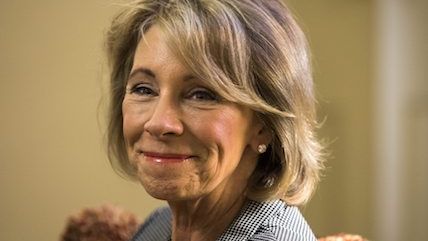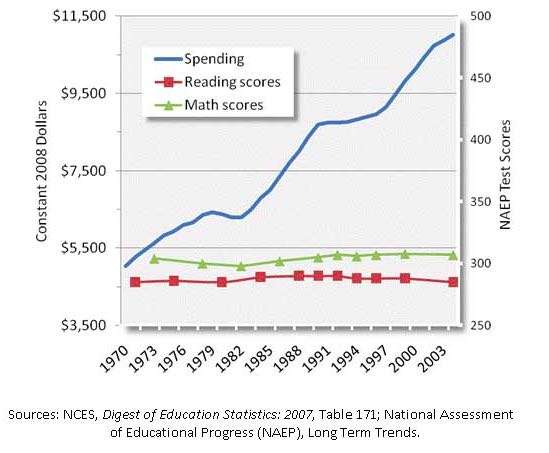Cher Attacks Betsy DeVos, Says 'Your Child Deserves More.' But Isn't School Choice 'More'?
When it comes to education, "more" must means "more choices."

As far as President Trump's Cabinet picks go, the left seems to have settled on Betsy DeVos as the person whose derailment is most attainable, or perhaps, most important. At the end of the day, the Democratic Party is still the Democratic Party, and still beholden to teachers unions—an interest group that reflexively opposes even modest education reforms.
Democrats are pulling out all the stops. MSNBC host Joy Reid put Michael Moore on her show to explain that DeVos "helped to ruin public education in Michigan," which is a lie. Sen. Cory Booker, a former ally of DeVos's who sat with her on the board of the Alliance for School Choice, has announced that he will vote against her confirmation (now that he wants to run for president, he can't risk alienating teachers unions, one presumes). And even liberal celebrities are anti-DeVos. Cher recently tweeted:
202-2243121 Contact senator& congressman-woman .Call both &Say NO"Betsy Devos".HER QUEST,2 DEFUND PUBLIC SCHOOLS.
UR CHILD DESERVES MORE.RT— Cher (@cher) January 22, 2017
The contention that DeVos wants to defund public schools is as absurd as the contention that she poisoned the water in Flint, Michigan. (Embarrassingly, many liberals are indeed insisting that DeVos had something to do with Flint, which is ludicrous.) DeVos merely recognizes some of the flaws inherent to the public education system: it takes in a whole lot of cash, and produces a whole lot of kids who can't read or do math well.
Cher is right that "UR CHILD DESERVES MORE." But what is meant by the more in that sentence? Is it more of the same exact system—a system that doesn't seem to improve, no matter how much money is thrown at it? Keep in mind that inflation-adjusted spending on education has doubled, while reading and math scores have stayed the same and high school graduation rates may have dipped.

Giving children more means giving them more choices. It means liberating them from the system as it exists currently—a system that requires kids to attend the public school in the zip code assigned to them at birth.
Not all public schools are bad; on the contrary, many public schools are great. But every kid is different, and what works for one family might not make sense for another. A certain zip code might have a school with a great college prep program that focuses on STEM education, but what about the kid who wants to study music? Why not let that kid take the per pupil funding allotted to him by the state and use it to pay for classes at an artsier institution?
When public schools are bad, the need for school choice reform is even more obvious. Give the money to the kids and let families decide what they should do with it. Competition for public dollars would incentivize public schools to improve their outputs—they wouldn't be able to afford to hang on to ineffective teachers. Indeed, this is precisely what frightens teachers unions so much about school choice: it threatens their monopoly.
Whether DeVos will be able to use the education secretary gig to push for reforms remains to be seen. But the fact that she supports the existence of alternatives to traditional public schooling should be viewed as positive, not a liability.
National School Choice Week, an annual event promoting the ability of parents and students to have greater options in K-12 education, starts today. Over 21,000 events involving almost 17,000 schools from all 50 states will take place over the coming days. Go here to get more information about events and data about how increasing school choice--charters, vouchers, educational savings accounts, and more--is one of the best ways to improve education for all Americans. As a proud media sponsor of National School Choice Week, Reason will be publishing daily articles, podcasts, videos, interviews, and other coverage exploring the ways in which education is being radically altered and made better by letting more people have more choices when it comes to learning. For a constantly updated list of stories, go to Reason's archive page on "school choice."


Show Comments (50)